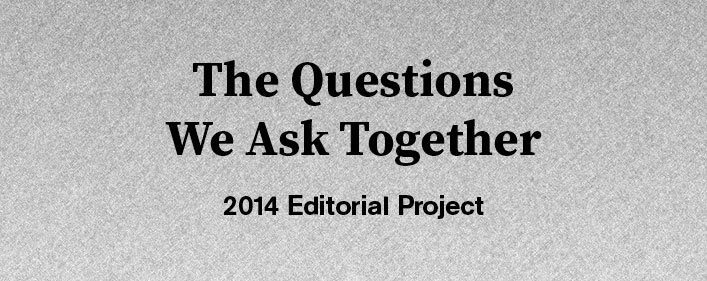Are trivial forms of participation better than no participation at all?
When I received this single question to answer for the 100 questions project, my brain kept rephrasing the question. I came up with multiple variations, like:
- Are minimal forms of participation better than no participation?
- Are limited forms of participation better than no participation?
- Are disingenuous forms of participation better than no participation?
I spent hours thinking about these alternate versions of the question, which yielded different so many more questions. Does an artist’s insincerity or cynicism result in “inauthentic” responses or participation? Does limited participation mean limited thought? Can minimal participation still have profound impact on the participant or the work? I built “yes” arguments and “no” arguments around these different versions. I then checked the question again, “Are trivial forms of participation better than no participation at all?” Through all of my thinking, from diagramming my ideas to investigating both institutional and individual points of view to answer these question variations, why had I subconsciously and consistently replaced the word trivial?
To understand my avoidance of the term, it was time to define it. A simple online query yielded multiple definitions of trivial, all of which orbit around being, “of little value or importance.” Synonyms included banal, inconsequential, trite, nonessential, petty, marginal, and frivolous. I considered how these words have been used, for example
- The government plans to cut “non-essential” curricular offerings including music and art activities in public schools.
- Sexuality is the frivolous fodder of fashion and lifestyle.
I realized I had a history with these words, many of which are used to challenge my ideas, perspectives, and subjectivities as an art educator, contemporary art aficionado, and student of queer and ethnic studies. I see these words employed to pathologize artists on a regular basis. I think being skeptical of triviality is healthy. I am still left with a question, what are the trivial forms of participation? What can we learn from those modes of action? Are the results of such participation, trivial as well?
Oliver Herring’s TASK provides a real and complex look into many of these questions around the banal, trivial and frivolous forms of participation. The premise of TASK is simple, assemble a space, people, and materials. Each participant writes a task on a piece of paper, then selects a task from the pile, interprets it, and executes with the materials and people in the space. When the task is complete, the participant writes a new task as a replacement for the completed task.
Almost reaching its ten-year anniversary, TASK has taken place across the country in museums, classrooms, community centers, and parks, both with and without the artist. What I find interesting is the way the project has been described in the press. In 2006, Blake Gopnik described the upcoming TASK event in the Washington Post.
“On Saturday at the Hirshhorn, New Yorker Oliver Herring will be making a live artwork called “Task” that pushes the domain of art into the trivial and everyday.”
What Gopnik writes is true, the project pushes art into the trivial and everyday by seeing how a task might be able to generate a sense of community, but what he doesn’t capture is the openness participants are able to cultivate through participation. They make themselves vulnerable to a world of possibility and each other. TASK transforms the ordinary into something a bit more extraordinary. There is a bit of magic in it.
My favorite coverage is this gem of incendiary criticism written by Regina Hackett for the Seattle Pi, titled “Oliver Herring’s Improv Event Suffers Fools Gladly.” The author writes,
“I more or less loathe the idea. It has roots in hypnotist stage shows, getting people from the audience to cluck like chickens or dance with imaginary dogs, and also in the trust exercises corporations made mandatory for employees in the 1980s…”Task” is voluntary. Come see a person with toilet paper under his nose. Gee, no thanks. Let me be my own fool of my own making, but I’m not going to do it to entertain others.”
What could be more frivolous than a hypnotist stage show? Why TASK, of course! Hackett will not participate in this ridiculous project, which has little to no value for her. The article reads more like comedy than arts journalism.
While I don’t think TASK could be deemed a form of trivial participation, I hope one could understand my skepticism around the term and its use to denigrate people, art, and culture. Perhaps it is time to lift the cover and show the “trivial” and “marginal” crevices of life where culture is developed, incubated, and still resides.
About the contributor: Marc Mayer works in the public programs department at the Asian Art Museum in San Francisco where he focuses on inserting contemporary art programming and performance into the context of historical, ethnically-specific museum. He initiated the Artists Drawing Club in 2013, an on-going program series which invites local artists to use the museum as a project platform to draw connections between ideas, art, culture, and time. Previously he has worked at Art21, the New Museum, and the Museum of Modern Art. asianart.org/
